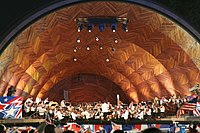Hatch Memorial Shell
 The Boston Pops performing at the Hatch Shell on July 4, 2005 | |
 | |
| Former names | Edward A. Hatch Memorial Shell |
|---|---|
| Location | Boston, Massachusetts |
| Coordinates | 42°21′26″N 71°04′25″W / 42.357311°N 71.073687°W |
| Owner | Department of Conservation and Recreation |
| Type | Outdoor amphitheater |
| Seating type | open |
| Capacity | 10,000 |
| Opened | 1928 |
The Edward A. Hatch Memorial Shell (commonly referred to as the "Hatch Shell") is an outdoor concert venue on the Charles River Esplanade in the Back Bay section of Boston, Massachusetts.
The Hatch Shell is best known for hosting the Boston Pops Orchestra annually for the Boston Fourth of July celebration, but is also used for free concerts most weekends and many weeknights during the summer months. The grass pavilion in front of the stage has no permanent seating. There is a memorial nearby to Arthur Fiedler, first permanent conductor of the Pops.
History
The original, wooden shell was built in 1928 as a temporary venue for the Pops with expectations of construction of a permanent structure in the near future. It was first used for a concert on July 4, 1929, with Arthur Fiedler conducting the Boston Pops Orchestra. A second, temporary shell, made of metal, was built in 1934, but owing to sparse funding throughout the Great Depression, construction of a permanent Hatch Shell was delayed until 1939–1940. Today's permanent shell was designed by architect Richard J. Shaw, given by Maria Hatch in memory of her brother, and dedicated on July 2, 1940. In preparation for its 50th anniversary in 1991, it underwent significant renovation and repair along with modernization of its acoustics by Boston architecture firm Finegold Alexander. Bostonian Howard Brickman, a master craftsman specializing in wood floors, re-created the intricate interior paneling of the shell by hand.
An 8-foot bronze statue of George S. Patton, by James Earle Fraser, commemorates the general's June 7, 1945 address at the site before a crowd of 20,000 persons.[1][2]
Uses of the Hatch Shell include concerts, movie showings and speeches, and as a meeting place for large events, such as AIDS Walk Boston and the Larry Kessler 5K Run. The grass pavilion is used for picnics, casual sports and sunbathing, in a manner typical of urban parks.
References
- Martha Burnham Humphrey, The Edward Hatch Memorial Shell: Richard Shaw, architect, William R. Barss, acoustic consultant, Maurice Reidy, structural engineer : dedicated July 2, 1940, published in 1940.
- Jim Vrabel, When in Boston: a time line & almanac, Bostonian Society, Northeastern University Press, 2004, page 294.
- ^ Blumenson, Martin (1974), The Patton Papers: 1940–1945, Boston, Massachusetts: Houghton Mifflin, ISBN 0-395-18498-3
- ^ https://www.flickr.com/photos/wallyg/4890118647/
